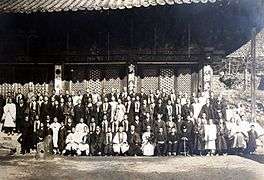Mangong
| Mangong 만공 滿空 | |
|---|---|
| Religion | Seon Buddhism |
| Personal | |
| Born | Korea |
| Senior posting | |
| Title | Zen Master |
| Part of a series on |
| Zen Buddhism |
|---|
 |
|
Persons Chán in China
Zen in Japan Seon in Korea Zen in the USA Category: Zen Buddhists |
|
Awakening |
|
Practice |
|
Related schools |
| Part of a series on |
| Buddhism |
|---|
 |
|

Mangong, circa 1940
Mangong (만공, 1871–1946) or Song Mangong was a Korean Buddhist monk, independence activist, scholar, poet, writer and philosopher, in the period of the Japanese Occupation of Korea. ManGong was born in Jeong Eup, Jeonbuk Province in 1871 and was ordained at the age of 14.[1] Except for three years’ Zen teaching in Mahayeon Temple in Keumkang Mountain and serving shortly as Abbot of Magok Temple, he spent most of his life teaching Zen at Deoksung Mountain in Yesan, Chungnam Province. Mangong revitalized the Zen tradition of Korean Buddhism along with his teacher, Zen Master Kyongho.[2]
See also
Gallery

Letter of Mangong (1930) 
Temple of Junwol, 1941 
Temple magoksa of monks (1930)
References
- ↑ "Wolmyeon Mangong". Bulgyo Sinmun. 12 January 2005. Retrieved 25 October 2015.
- ↑ "Temple plaque of Zen Master Mangong". Hyeondai Bulgyo. 15 November 2000. Retrieved 25 October 2015.
Web site
- http://www.ibulgyo.com/news/articleView.html?idxno=63691
- http://www.ibulgyo.com/news/articleView.html?idxno=84271
- http://www.ibulgyo.com/news/articleView.html?idxno=85495
- http://www.ibulgyo.com/news/articleView.html?idxno=90104
This article is issued from
Wikipedia.
The text is licensed under Creative Commons - Attribution - Sharealike.
Additional terms may apply for the media files.